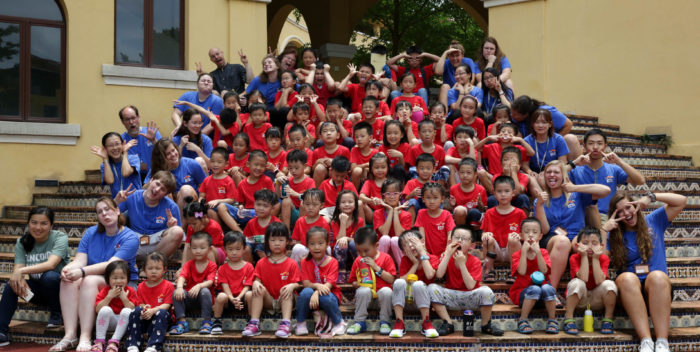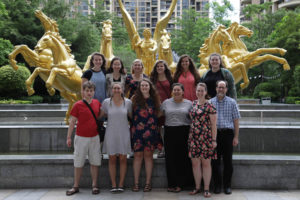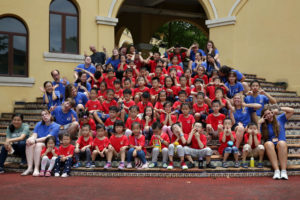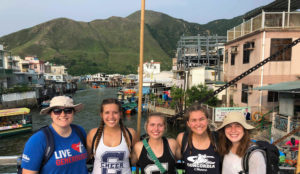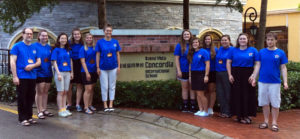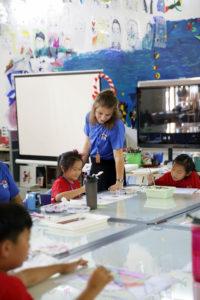CUNE Students Lead ESL Summer Camps in China
Ten Concordia students went to China over the summer to help teach ESL summer camps at a school in Shenzhen
By Britnee Fear
Concordia has been sending students to China to teach at English as a Second Language (ESL) summer camps for the past six years. Concordia students are continually invited back by the Lutheran Church—Hong Kong Synod to lead camps at Buena Vista Concordia International School (BCIS) in Shenzhen, China.
This year, 10 students were selected to go along with Dr. Vicki Anderson, chair of intercultural studies and modern languages, who has been the faculty leader of the trip since the program started. The students included seniors Kennedy Garner, Hannah Gillet, Emma Heidorn, Ashley Martin, Krista Stanford, and Hannah Sugita, and juniors Emily Altman, Emma Brand, Payton DeMers-Sahling, and Katerina Fuller.
Adjunct professor Jon Anderson and Sebastian Anderson, son of Dr. and Professor Anderson, also came to teach. Video Producer & Multimedia Developer Aaron Nix and Writer & Social Media Producer Danielle Luebbe from marketing also went along for two weeks to collect promotional materials for BCIS.
The Concordia students received the opportunity to teach at two different camps, Camp A and Camp B. Camp A lasted two weeks, and Camp B lasted three weeks. Camp A’s students were more proficient in English than Camp B’s students, as Camp A’s students came from BCIS, while most of Camp B’s students came from the public school system.
“Our student teachers really developed successful classroom management and teaching strategies by the time Camp B rolled around, even though Camp B was a lot harder because the English level of the students was so much lower, but we had one more week to really build relationships with the students than we did in Camp A,” Dr. Anderson said.
This year’s Camp A had around 63 students enrolled, and Camp B had around 105.
In order to prepare for the two camps, the Concordia students met weekly and learned about the culture, what would be expected of them, and how to teach and communicate with English Language Learners. They spent most of their time during the meetings creating the curriculum and lesson plans.
“The first day of teaching was very exciting, but also really stressful,” DeMers-Sahling said. “All that work that I did lesson planning did not work out, because the students were smarter and knew a lot more than I thought they would, so I had to redo all my lesson plans.”
While the Concordia students were sent there to teach, they also had time to explore China and Hong Kong. They went to the fourth largest building in the world, the Ping An Finance Centre in Shenzhen; Disneyland in Hong Kong; the Big Buddha; Tai O Fishing Village; the Victoria Peak; Shenzhen Bay; different markets; and many more places.
Every Sunday they attended the English service at Nanshan Christian Church where they worshipped God among other Christians.
“I saw God working through the unique faith of Chinese members of the church and their emphasis on community, prayer and growth,” Brand said.
“They were happy, despite the language barrier, despite the leering eyes of the government, despite the social pressure,” Gillet said. “They were happy just being in the presence of God and their brothers and sisters in Christ.”
One of the church members had a coffee shop in a building for tech company employees that hosts an event called English Corner on Thursday nights, and the Concordia students were invited over to help stimulate conversations in small groups.
“It turned into an excellent venue for sharing about faith and how God works in people’s lives,” Dr. Anderson said.
Shenzhen is not a very diverse or westernized city in China, and the Concordia students became very aware of the differences every time they stepped outside.
“It was different being in China and being the only group of white people walking around in the area we were in. No one really knew we were from America, but they would just stare at us because of the fact that we were white. Some smiled, but others just stared,” DeMers-Sahling said.
“I was keenly aware that I looked foreign to the people in China. Especially as a group all together, we stood out drastically. However, sometimes there were moments of connection that made me doubt the existence of the concept of a language barrier,” Brand said. “Despite all the stares and the awkward photos, we were able to connect with the people who were working alongside us in the city, and that made up for it.”
Dr. Anderson takes pride and humility in the groups she leads each year and has learned to stand back and be amazed at the growth that the student teachers show personally, professionally and spiritually.
“I’m not the orchestrator of all that, God is. Seeing the students grow into teachers, discover their strengths and weaknesses, and develop their own teaching style is, hands down, the best part about being with the Concordia students in China,” Dr. Anderson said.
If students are considering applying for next year’s China trip, Dr. Anderson encourages all students to apply, even if they are not education majors. If they have experience working with children, they should not shy away from the opportunity.
“To someone who is thinking about applying to teach in China, do it. It will change your life. It will help you realize your passions and that your passions matter,” Brand said. “You will realize that you are capable of thinking quickly and that you also have a lot to learn. It’s worth experiencing being uncomfortable for the sake of learning new things and making relationships that will stay with you.”
The application for the trip focuses on flexibility, experiences abroad and the overall outlook of being a teacher in a new environment.
“It is a phenomenal experience to learn about another culture, see what God is doing in another location, learn more about teaching, and contribute to the ministry in Shenzhen,” Dr. Anderson said.
You can learn more about their China experience by watching their vlog at http://www.cune.edu/china.


